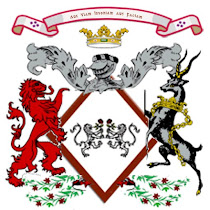For Mme. Nicholas
For those who read the Proceedings of the Royal Society, you will know of Lady Kate Nicholas' interest in historical...er...future....events which take place in Russia. This is my gift to her today on the historical anniversary of the October Revolution. A brief review of the events leading to this extraordinarily significant event, and some information on the Revolution itself.
Nicholas II
As the year 1917 began, the atmosphere in Russia was ripe for revolution and change. Peasant villagers often migrated between agrarian and industrial work environments, and many relocated entirely, creating an expanding urban labor force. A middle class of white-collar employees, was on the rise. Even the nobles had to find new ways to subsist in this changing economy, and contemporaries spoke of new classes forming (proletarians and capitalists, for example).
The boundaries between the classes was shifting and blurring continuously. The culture was becoming much more commercialized and was creating new objects of desire. The growth of political consciousness, the impact of revolutionary ideas, and the weak and inefficient system of government, which had been debilitated further by its participation in World War I, seemed to do nothing to convince Nicholas II that any reform was necessary.
The populace felt Nicholas was out of touch with the needs and aspirations of the Russian people, the vast majority of whom were victims of the wretched socio-economic conditions which prevailed. There were few opportunities for the advancement of most in society.
Politically, many Russians, as well as non-Russian subjects of the crown, had reason to be dissatisfied with the existing autocratic system. Nicholas II was a deeply conservative ruler. His criteria of virtue—orderliness, family, and duty—were viewed as both personal ideals for a moral individual and rules for society and politics. Individuals and society alike were expected to show self-restraint, devotion to community and hierarchy, and a spirit of duty to country and tradition. Religious faith helped bind all this together: as a source of comfort and reassurance in the face of contradictory conditions, as a source of insight into the divine will, as a source of state power and authority.
The February Revolution, which ultimately ended with the abdication of Nicholas II in early March, broke out without definite leadership and formal plans, which may be seen as indicative of the fact that the Russian people had had quite enough of the existing system. After this event, leadership moved gradually to Alexander Kerensky of the Social Revolutionary Party.
Kerensky faced several great challenges: other political groups' challenges, heavy military losses on the front lines, defecting soldiers, discontent with the ongoing war, enormous shortages of food and supplies.

The Bolshevik Party led by Vladamir Lenin was growing in strength despite some earlier defeats and missteps. Lenin led his leftist revolutionaries in the October Revolution. The October Revolution ended the phase of the revolution instigated in February, replacing Russia's short-lived provisional parliamentary government with government by Soviets.
Soviet membership was initially freely elected, but many members of the Socialist-Revolutionary Party, anarchists, and other leftists opposed the Bolsheviks through the soviets. When it became clear that the Bolsheviks had little support outside of the industrialized areas of St. Petersburg and Moscow, they barred non-Bolsheviks from membership in the soviets. Other socialists revolted and called for "a third revolution." The most notable instances were the Tambov rebellion, 1919–1921, and the Kronstadt rebellion in March 1921. These movements, which made a wide range of demands and lacked effective coordination, were eventually defeated along with the White Army during the Civil War.




